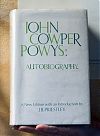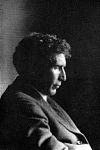
John Cowper Powys
Autobiography
It was Simon’s habit, when making reference to this book, to this Autobiography by John Cowper Powys, to call it the “brick.” My hardcover edition could, with the help of some fine mortar, no doubt lay a foundation for it is heavier than slate. The symbol stuck and like the lichen which coats the trunks of the oldest in the olive groves and nestles into the crumbled walls of old villages, it began to slowly grow. Though those who are hasty and quickly bored would pass such trunks, walls and bricks by, they would miss that this brick is flecked with the most mystical and sensational gold.
Autobiography is heavy and at times interminably dull. John Cowper Powys is meticulous and in the upmost devoted to every single life-sensation so that this book is less an autobiography and is more a chronicle of a life self-observed in its subtlest forms. Which is why, when from amongst the prattle there arose such insight! such brilliance! that surfaced and shone and awed me into contemplatively setting the brick down. Autobiography becomes like a manual whose subscript reads: Never never never short your life-illusion!
In fact it may be said at once that the grand struggle of my life has been between my conscience and my impulse to live a life made up solely and entirely of sensual-mystical sensations.
And:
By slow degrees it has made itself known to me that the purpose of my life was to dodge—when I could get leave of absence from my exacting conscience—all obligations to humanity and to cultivate certain totally useless, purposeless, unprofitable feelings.
The gold vein runs so thick at times. The impact of the flakes and flecks renders me still, so that I may then absorb what John Cowper Powys writes about when he writes about his life-illusion. I do not only begin to understand in an imperceptible way but I begin to try to follow his examples so that I too may bolster my conscious conceptions and configurations of what I have begun to call my life-illusion. The Magic of this genius, scattered through interminable pages has enough mystical otherworldly force in it to enhance, alter and irrevocably deepen what I “see” on a daily basis. Henry Miller did this to me—and continues to do still—bombastically and boldly. John Cowper Powys does it imperceptibly, eccentrically, magically.
I have always believed that the imagination and the will have a creative power. What a person wills and what a person imagines become a mysterious part of what is. It is madness to spend your days trying to eliminate what your own will and spirit and imagination are perpetually adding to the mystery of life.
Do not short yourself or your life-illusion! Let it feast on the most fertile food it can find, the most eccentric, the most true to your nature, feed feed until you’re full and then move on, guiltlessly, to the next. “The Mystery of Life” is a deep river running through us all. Those who dare not to cower before the strengths of social conformities and external pressures, cultivate the life-illusion that is their own and do not doubt it. “Independence! Independence!” John Cowper Powys wrote, “That is the secret to all philosophy.” I must believe that those who have searched their deepest abyss and have resurfaced time and again, hold in their hands the envelope of their selves onto which they must blindly rest their whole life’s belief.
To live out one’s life-illusion to the end of one’s life is no little chore. John Cowper Powys had this tenacious skill; he was himself from the beginning until the end.
… I am inclined to think that the two great electric currents of my life, the currents that have gathered and gathered their momentum beneath all the changes and chances of circumstance have been first the gradual discovering and the gradual strengthening of my inmost identity, till it can flow like water and petrify like stone; and second the magic trick of losing myself in the continuity of the human generations.
Autobiography was not written at the end of a life of long writing, but at the beginning of a writing career begun in his sixties. It was written in nine-months in long hand. It was written in Phudd Bottom, up-state New York, before he sailed his return to England. It was written in flamboyance characteristic of one who knows oneself from the inside out. There are no dates, no concrete markings to count the passing of Time. It is a collection of feelings and well-formed ideas. Autobiography was written as John Cowper Powys laid on his back, after he submerged his head in a bucket of water, after he tapped is forehead on sacred rocks and said his prayers to the dead and living, bowed his head to the trees and earth-mounds, he wrote it.
We are all mad; and the best thing is to learn to forget our madness. Forget it! Never fight against it.
John Cowper Powys was very careful to include his “fetishes” and his fear of evacuating himself in public, the terrors of Prep school and his three counts of sadism. As equally, he was careful that his history-so-far would “contain No Women at all.” I was left with a very large mystery ; a large part of his private life was gone missing. What was John Cowper Powys’ relationship with women? Which women? How did these relationship influence his writing? My questions grew and were left hanging. He kept his promise—true to form—of not writing anything that would hurt any female. To quench this curiosity I must then pick up Morine Krissdottir’s biography: Descents of Memory.
There were women that John Cowper Powys included, but these women only managed to tilt the scale for me so far in the sexually misfitted direction. These women were the “Messengers of the Grail.” Burlesque dancers, girls taking sun on Brighton beach, theatre performers, girls in the street, sketches of girls in Ally Sloper, girls in bawdy French book, girls with knees and ankles, girls whose bodies were the Holy Grail. It was not that I found his eccentric eroticism especially disturbing, because mostly it was simply strange; but that I prefer more, more than just a “Grail.” To be made to digest so many “fetishes” and never any hints of female love is like eating dough instead of cake.
What John Cowper Powys gives us in Autobiography is a “living portrait” of a writer of the old lineage. His reverence for Nature and the inanimate spirit, his piquant observations, his blazing eccentricities, his staunch tie to all that stretches its brave limbs through the annals of history, his merciless prose are the many veins of gold in this dull rock. Autobiography goes to every limit but the female one. Do not pick up this book if you haven’t made it though a book of his before, I warn you! You’ll then know what was meant when some patron to his lectures muttered that he’s a “long winded bore.”
But, if you are like me and like John Cowper Powys enough to revere him, obsess over him as an insightful, invigorating, life-giving spirit, than you will discover those bits of metaphysical gold. John Cowper Powys had a life-illusion! When this life-illusion strikes by tangents or by bold shafts of light, on my own life-illusion, there refracts a great blaze like an extinguishing star. “Of this I am as certain as I am certain that I am I.”
Bracciano Italia
November 2008
Commentary for Autobiography
You are the kind of writer I’ve been waiting to encounter on a blog, Amber. As for Powys, he’s an old friend, though I know him only through his books, & some pieces I wrote on him too, around ten years ago, for example http://www.ian.mulder.clara.net/josaturn.htm on the “Autobiography”.
I got to this page in search of a neat definition of what Powys meant by “life-illusion” (to see if I could recycle the term for my own use). I’m glad I did even though it leads to a temporary digression from that quest!
I met john once many, many years ago on Weymouth bay as I was collecting shells with my sister, and he said to me the following words: “those shells you hold in your hand and the sun that burns your shoulders speak a language that you know and which burns behind your eyes and soon you will lose it to another world”. I was only ten and my sister was fourteen and it was she who helped me remember and treasure those words. I’m getting on now and really don’t understand what that strange man meant but I did see him a couple of times after that, once on the bay and another in town and on one of those occasions, I can’t remember which, he looked weirdly at me and said “tear or shear the sunlit (something). I found out a bit about him later but forgot about him until recently. Strange how you come back to memories.
· · · · · · · · · · · · · · · · · · · ·

1 On Saturday 05 March 2011 Don Couch wrote:
For those of us who, as young men, dug ditches for a few pennys, and later became Engineers and Builders of all sorts of wonderful things like Airports, Highways, Offices and Hangers it does not appear that we would appreciate John C. Powys world or his works. To me, as a person, educated to concieve, build, occupy and use big things, all this flowery language flatly turns me off. Where did this guy come from? What, in the world, is bis background? Could he be “a little light in the loafers”—He sounds like a strange one. If his writng is like your review, then he very well could be boring.